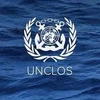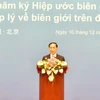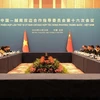Vietnamese Prime Minister Nguyen Tan Dung has called for the building and reinforcement of strategic trust for peace, cooperation, development and prosperity in the Asia-Pacific region on the basis of international law.
Delivering a keynote speech at the opening ceremony of the 12th Shangri La Dialogue in Singapore on May 31, Dung emphasised the upholding of responsibilities of all nations in the region, especially major powers.
The PM stressed that above all, the most important factors in building strategic trust are honesty and sincerity in the relations and cooperation among countries as well as in cooperation in dealing with common challenges in the region.
He highlighted the indispensable role and contributions of an unanimous and united ASEAN and its central role in many multilateral cooperation forums.
Regarding the East Sea issue, PM Dung affirmed the significance of peace, stability, maritime security and safety in the East Sea.
ASEAN and China need to raise high their responsibility and work together to reinforce strategic trust, with the first evidence of this being the strict implementation of the Declaration on the Conduct of Parties in the East Sea (DOC) and efforts to build a Code of Conduct in the East Sea at an early date in line with international law, especially the 1982 United Nations Convention on the Law of the Sea (1982 UNCLOS), said the PM.
He said that ASEAN and its partners can work together to develop a feasible mechanism that could guarantee maritime security, safety and freedom in the region, helping maintain peace, stability and development cooperation in the region and the world.
The Vietnamese Government leader stated that Vietnam consistently pursues a foreign policy of independence, self-reliance, multilateralism and diversification of relations, being a friend and reliable partner of all nations, and a responsible member of the international community.
Vietnam has spared no efforts to build and deepen mutually beneficial strategic partnerships and cooperative partnerships with other countries, said PM Dung, stressing his country’s desire to establish strategic partnerships with all the permanent members of the UN Security Council once the principles of independence, sovereignty and non-interference in the internal affairs of each other, mutual respect, equal and mutually beneficial cooperation are committed to and seriously implemented.
He affirmed that Vietnam ’s defence policy is that of peace and self-defence. “Vietnam will not be a military ally to any country and will not allow any country to set up military bases on Vietnamese territory, and will not ally itself with any country to counter another”, he said.
On the occasion, the Vietnamese leader also announced that Vietnam has decided to take part in United Nations peace-keeping activities, firstly in engineering, army medical care and military observation.
Initiated by the International Institute for Strategic Studies (IISS), the annual Asia Security Summit, or Shangri La Dialogue, was first held in 2002.
It is a venue for leaders, policymakers and scholars across Asia-Pacific to discuss regional and global situations, strategic orientations for regional security, measures to promote defence cooperation and enhance mutual understanding and trust.
This year’s event will bring together government leaders, defence ministers and top security analysts from 27 Asia-Pacific countries, including 10 ASEAN member nations and others such as China, Japan, the Republic of Korea, India, the US, Russia, Canada, the UK and France.-VNA
Delivering a keynote speech at the opening ceremony of the 12th Shangri La Dialogue in Singapore on May 31, Dung emphasised the upholding of responsibilities of all nations in the region, especially major powers.
The PM stressed that above all, the most important factors in building strategic trust are honesty and sincerity in the relations and cooperation among countries as well as in cooperation in dealing with common challenges in the region.
He highlighted the indispensable role and contributions of an unanimous and united ASEAN and its central role in many multilateral cooperation forums.
Regarding the East Sea issue, PM Dung affirmed the significance of peace, stability, maritime security and safety in the East Sea.
ASEAN and China need to raise high their responsibility and work together to reinforce strategic trust, with the first evidence of this being the strict implementation of the Declaration on the Conduct of Parties in the East Sea (DOC) and efforts to build a Code of Conduct in the East Sea at an early date in line with international law, especially the 1982 United Nations Convention on the Law of the Sea (1982 UNCLOS), said the PM.
He said that ASEAN and its partners can work together to develop a feasible mechanism that could guarantee maritime security, safety and freedom in the region, helping maintain peace, stability and development cooperation in the region and the world.
The Vietnamese Government leader stated that Vietnam consistently pursues a foreign policy of independence, self-reliance, multilateralism and diversification of relations, being a friend and reliable partner of all nations, and a responsible member of the international community.
Vietnam has spared no efforts to build and deepen mutually beneficial strategic partnerships and cooperative partnerships with other countries, said PM Dung, stressing his country’s desire to establish strategic partnerships with all the permanent members of the UN Security Council once the principles of independence, sovereignty and non-interference in the internal affairs of each other, mutual respect, equal and mutually beneficial cooperation are committed to and seriously implemented.
He affirmed that Vietnam ’s defence policy is that of peace and self-defence. “Vietnam will not be a military ally to any country and will not allow any country to set up military bases on Vietnamese territory, and will not ally itself with any country to counter another”, he said.
On the occasion, the Vietnamese leader also announced that Vietnam has decided to take part in United Nations peace-keeping activities, firstly in engineering, army medical care and military observation.
Initiated by the International Institute for Strategic Studies (IISS), the annual Asia Security Summit, or Shangri La Dialogue, was first held in 2002.
It is a venue for leaders, policymakers and scholars across Asia-Pacific to discuss regional and global situations, strategic orientations for regional security, measures to promote defence cooperation and enhance mutual understanding and trust.
This year’s event will bring together government leaders, defence ministers and top security analysts from 27 Asia-Pacific countries, including 10 ASEAN member nations and others such as China, Japan, the Republic of Korea, India, the US, Russia, Canada, the UK and France.-VNA



















